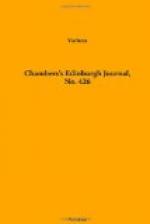The action of the Revolution was in the hands of three parties, into which the Convention was divided—namely, the Montagnards, the Girondists, and the Plaine. The last mentioned were a comparatively harmless set of persons, who acted as a neutral body, and leaned one way or the other according to their convictions, but whose votes it was important to obtain. Between the Montagnards and the Girondists there was no distinct difference of principle—both were keen republicans and levellers; but in carrying out their views, the Montagnards were the most violent and unscrupulous. The Girondists expected that, after a little preliminary harshness, the Republic would be established in a pacific manner; by the force, it may be called, of philosophic conviction spreading through society. They were thus the moderates; yet their moderation was unfortunately ill manifested. At the outset, they countenanced the disgraceful mobbings of the royal family; they gloried in the horrors of the 10th of August, and the humiliation of the king; and only began to express fears that things were going too far, when massacre became the order of the day, and the guillotine assumed the character of a national institution. They were finally borne down, as is well known, by the superior energy and audacity of their opponents; and all perished one way or other in the bloody struggle. Few pity them.
We need hardly recall the fact, that the discussions in the Convention were greatly influenced by tumultuary movements out of doors. At a short distance, were two political clubs, the Jacobins and the Cordeliers, and there everything was debated and determined on. Of these notorious clubs, the most uncompromising was the Jacobins; consequently, its principal members were to be found among the party of the Montagnards. During the hottest time of the Revolution, the three men most distinguished as Montagnards and Jacobins were Marat, Danton, and Robespierre. Mirabeau, the orator of the Revolution, had already disappeared, being so fortunate as to die naturally, before the practice of mutual guillotining was established. After him, Vergniaud, the leader of the Girondists, was perhaps the most effective speaker; and till his fall, he possessed a commanding influence in the Convention. Danton was likewise a speaker of vast power, and from his towering figure, he seemed like a giant among pigmies. Marat might be termed the representative of the kennel. He was a low demagogue, flaunting in rags, dirty, and venomous: he was always calling out for more blood, as if the grand desideratum was the annihilation of mankind. Among the extreme men, Robespierre, by his eloquence, his artifice, and his bold counsels, contrived to maintain his position. This was no easy matter, for it was necessary to remain firm and unfaltering in every emergency. He, like the others at the helm of affairs, was constantly impelled forward by the clubs, but more so by the incessant clamours of the mob. At the Hotel de




